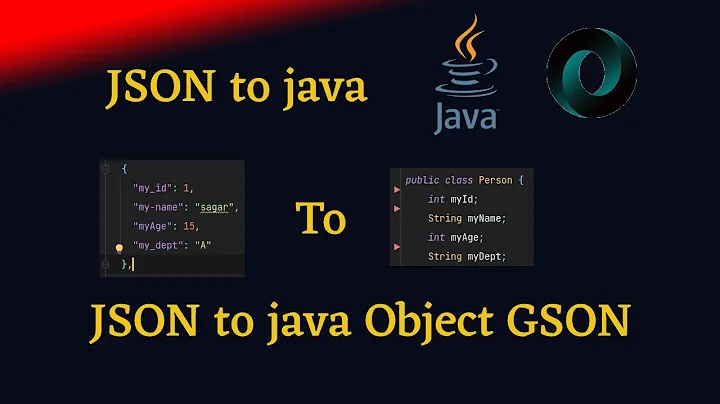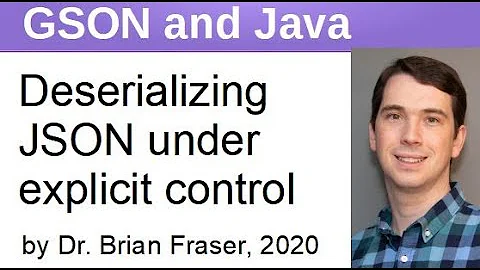How can I convert JSON to a HashMap using Gson?
Solution 1
Here you go:
import java.lang.reflect.Type;
import com.google.gson.reflect.TypeToken;
Type type = new TypeToken<Map<String, String>>(){}.getType();
Map<String, String> myMap = gson.fromJson("{'k1':'apple','k2':'orange'}", type);
Solution 2
This code works:
Gson gson = new Gson();
String json = "{\"k1\":\"v1\",\"k2\":\"v2\"}";
Map<String,Object> map = new HashMap<String,Object>();
map = (Map<String,Object>) gson.fromJson(json, map.getClass());
Solution 3
I know this is a fairly old question, but I was searching for a solution to generically deserialize nested JSON to a Map<String, Object>, and found nothing.
The way my yaml deserializer works, it defaults JSON objects to Map<String, Object> when you don't specify a type, but gson doesn't seem to do this. Luckily you can accomplish it with a custom deserializer.
I used the following deserializer to naturally deserialize anything, defaulting JsonObjects to Map<String, Object> and JsonArrays to Object[]s, where all the children are similarly deserialized.
private static class NaturalDeserializer implements JsonDeserializer<Object> {
public Object deserialize(JsonElement json, Type typeOfT,
JsonDeserializationContext context) {
if(json.isJsonNull()) return null;
else if(json.isJsonPrimitive()) return handlePrimitive(json.getAsJsonPrimitive());
else if(json.isJsonArray()) return handleArray(json.getAsJsonArray(), context);
else return handleObject(json.getAsJsonObject(), context);
}
private Object handlePrimitive(JsonPrimitive json) {
if(json.isBoolean())
return json.getAsBoolean();
else if(json.isString())
return json.getAsString();
else {
BigDecimal bigDec = json.getAsBigDecimal();
// Find out if it is an int type
try {
bigDec.toBigIntegerExact();
try { return bigDec.intValueExact(); }
catch(ArithmeticException e) {}
return bigDec.longValue();
} catch(ArithmeticException e) {}
// Just return it as a double
return bigDec.doubleValue();
}
}
private Object handleArray(JsonArray json, JsonDeserializationContext context) {
Object[] array = new Object[json.size()];
for(int i = 0; i < array.length; i++)
array[i] = context.deserialize(json.get(i), Object.class);
return array;
}
private Object handleObject(JsonObject json, JsonDeserializationContext context) {
Map<String, Object> map = new HashMap<String, Object>();
for(Map.Entry<String, JsonElement> entry : json.entrySet())
map.put(entry.getKey(), context.deserialize(entry.getValue(), Object.class));
return map;
}
}
The messiness inside the handlePrimitive method is for making sure you only ever get a Double or an Integer or a Long, and probably could be better, or at least simplified if you're okay with getting BigDecimals, which I believe is the default.
You can register this adapter like:
GsonBuilder gsonBuilder = new GsonBuilder();
gsonBuilder.registerTypeAdapter(Object.class, new NaturalDeserializer());
Gson gson = gsonBuilder.create();
And then call it like:
Object natural = gson.fromJson(source, Object.class);
I'm not sure why this is not the default behavior in gson, since it is in most other semi-structured serialization libraries...
Solution 4
With google's Gson 2.7 (probably earlier versions too, but I tested with the current version 2.7) it's as simple as:
Gson gson = new Gson();
Map map = gson.fromJson(jsonString, Map.class);
Which returns a Map of type com.google.gson.internal.LinkedTreeMap and works recursively on nested objects, arrays, etc.
I ran the OP example like so (simply replaced double- with single-quotes and removed whitespace):
String jsonString = "{'header': {'alerts': [{'AlertID': '2', 'TSExpires': null, 'Target': '1', 'Text': 'woot', 'Type': '1'}, {'AlertID': '3', 'TSExpires': null, 'Target': '1', 'Text': 'woot', 'Type': '1'}], 'session': '0bc8d0835f93ac3ebbf11560b2c5be9a'}, 'result': '4be26bc400d3c'}";
Map map = gson.fromJson(jsonString, Map.class);
System.out.println(map.getClass().toString());
System.out.println(map);
And got the following output:
class com.google.gson.internal.LinkedTreeMap
{header={alerts=[{AlertID=2, TSExpires=null, Target=1, Text=woot, Type=1}, {AlertID=3, TSExpires=null, Target=1, Text=woot, Type=1}], session=0bc8d0835f93ac3ebbf11560b2c5be9a}, result=4be26bc400d3c}
Solution 5
Update for new Gson lib:
You now can parse nested Json to Map directly, but you should be aware in case you try to parse Json to Map<String, Object> type: it will raise exception. To fix this, just declare the result as LinkedTreeMap type. Example below:
String nestedJSON = "{\"id\":\"1\",\"message\":\"web_didload\",\"content\":{\"success\":1}}";
Gson gson = new Gson();
LinkedTreeMap result = gson.fromJson(nestedJSON , LinkedTreeMap.class);
Related videos on Youtube
Mridang Agarwalla
I'm a software developer who relishes authoring Java and Python, hacking on Android and toying with AppEngine. I have a penchant for development and a passion for the business side of software. In between all the work, I contribute to a number of open-source projects, learn to master the art of cooking Asian cuisine and try to stay sane while learning to fly my Align Trex-600 Nitro Heli.
Updated on March 28, 2022Comments
-
 Mridang Agarwalla over 2 years
Mridang Agarwalla over 2 yearsI'm requesting data from a server which returns data in the JSON format. Casting a HashMap into JSON when making the request wasn't hard at all but the other way seems to be a little tricky. The JSON response looks like this:
{ "header" : { "alerts" : [ { "AlertID" : "2", "TSExpires" : null, "Target" : "1", "Text" : "woot", "Type" : "1" }, { "AlertID" : "3", "TSExpires" : null, "Target" : "1", "Text" : "woot", "Type" : "1" } ], "session" : "0bc8d0835f93ac3ebbf11560b2c5be9a" }, "result" : "4be26bc400d3c" }What way would be easiest to access this data? I'm using the GSON module.
-
 Ferran Maylinch over 8 years
Ferran Maylinch over 8 yearsMap<String,Object> result = new Gson().fromJson(json, Map.class);works with gson 2.6.2.
-
-
Matt Zukowski about 13 years... although I'm not quite sure what to do now with the Objects I get back. Can't seem to cast them as String even though I know they're strings
-
Matt Zukowski about 13 yearsAha! The trick was the call the deserializer recursively instead of the context.deserialize() call.
-
Megasaur about 13 yearsThanks for that. It's a little strange that it does not do this my by itself.
-
Romain Piel almost 13 yearsWould you have some code Matt? I'm trying to make the changes on the deserializer but I can't really see your point
-
 Ammar over 12 yearsThis is from json-lib, not gson!
Ammar over 12 yearsThis is from json-lib, not gson! -
louielouie over 11 yearsThis will convert ints to floats before it turns them into strings, but it will work to convert JSON into maps for comparison purposes.
-
eleotlecram over 11 years@kirhgoff: It works for me, but you have to do what Matt Zukowski says: call the deserializer recursively.
-
eleotlecram over 11 years@Romain Piel: You have to make two changes to Kevin's code to make it recursively: 1) array[i] = context.deserialize(json.get(i), Object.class); --> array[i] = this.deserialize(json.get(i), Object.class, context); 2) map.put(entry.getKey(), context.deserialize(entry.getValue(), Object.class)); --> map.put(entry.getKey(), this.deserialize(entry.getValue(), Object.class, context));
-
eleotlecram over 11 yearsGson now by default appears to have the behavior that Kevin Dolan is going for in his code snippet.
-
Moshe Shaham almost 11 yearsworks great for me, but I changed the map to
Map<String, Object>because if the json is not only strings you get an error -
 Someone Somewhere over 10 yearsUsing this I still get Double's instead of Integer's when converting to Object's (using a gson library > 1.7). Disappointed.
Someone Somewhere over 10 yearsUsing this I still get Double's instead of Integer's when converting to Object's (using a gson library > 1.7). Disappointed. -
mmm111mmm over 10 yearsThis worked for me after HashMap threw an LinkedTreeMap exception.
-
AlikElzin-kilaka about 10 yearsGood one but I don't like using
TypeToken- it does implicit casting inside. -
M.Y. almost 10 years@SomeoneSomewhere see accepted answer here stackoverflow.com/questions/14944419/gson-to-hashmap
-
HelpMeStackOverflowMyOnlyHope almost 10 yearsWhere do I import LinkedTreeMap from? I can't find it in the Gson code.
-
Hoang Nguyen Huu about 9 yearsAs I remember, LinkedTreeMap is defined in new Gson lib. You can check here: code.google.com/p/google-gson/source/browse/trunk/gson/src/main/…
-
 Ferran Maylinch over 8 yearsFor me it works also with
Ferran Maylinch over 8 yearsFor me it works also withMap<String,Object> result = gson.fromJson(json , Map.class);. Using gson 2.6.2. -
Sotirios Delimanolis almost 8 yearsThis gives the wrong impression. The correct solution for parameterized types is
TypeToken. -
 Andy over 7 years@SomeoneSomewhere I tried this code with the latest Gson and it doesn't even call NaturalDeserializer, that's why. I think it just calls its default handler for Object.
Andy over 7 years@SomeoneSomewhere I tried this code with the latest Gson and it doesn't even call NaturalDeserializer, that's why. I think it just calls its default handler for Object. -
 Dexter over 7 yearsCasting to Map<>, you ended my hours of frustration !
Dexter over 7 yearsCasting to Map<>, you ended my hours of frustration ! -
Line about 7 yearsThis gives me unchecked conversion warning.
-
Leon almost 6 yearsThis would be a generic solution for all types, but a little bit uncommon.
-
 Evan Kairuz over 5 yearsIs that valid json in the example?
Evan Kairuz over 5 yearsIs that valid json in the example? -
Vadim Kotov almost 5 years@EvanKairuz No, it is not. It should be
{"k1":"apple","k2":"orange"} -
 Ravi Yadav over 4 yearswhat if I need to convert string which is actually a array
Ravi Yadav over 4 yearswhat if I need to convert string which is actually a array -
 Martin Meeser about 4 yearsyes it is one line but keep in mind that
Martin Meeser about 4 yearsyes it is one line but keep in mind thatnew TypeToken<HashMap<String, Object>>(){}will create a new inline sub-class, and all linters will raise a warning at least I guess -
 roottraveller almost 4 years
roottraveller almost 4 yearsnew Gson().fromJson(jsonData, new TypeToken<Map<String, Integer>>(){}.getType());is converting toDoublenotInteger?? -
 gcr about 3 yearsFor me what worked (thanks to advice above!) is convert nested
gcr about 3 yearsFor me what worked (thanks to advice above!) is convert nestedHashMap<String, Object>(because the TypeToken trick didn't work for me on nested) was to return them just as LinkedTreeMap objects. From there I just iterated over the LinkedTreeMap keys and populated new HashMaps in the loop, as they have the same methods. Don't know why you can't straight cast but met my level of need. -
user666 about 3 yearswhat if the json contains nested objects or lists? how can we have them in the map without having to deal with maps as values?
-
 Ferran Maylinch about 3 yearsThis solution has caused me problems with nested objects, so I finally used
Ferran Maylinch about 3 yearsThis solution has caused me problems with nested objects, so I finally usednew Gson().fromJson(json, Map.class);


![[Tutorial] Parse JSON data to Java Objects with Gson](https://i.ytimg.com/vi/y96VcLgOJqA/hq720.jpg?sqp=-oaymwEcCNAFEJQDSFXyq4qpAw4IARUAAIhCGAFwAcABBg==&rs=AOn4CLDFQ2K7jQhlSyYTJaRZ2V25oGU4bQ)



